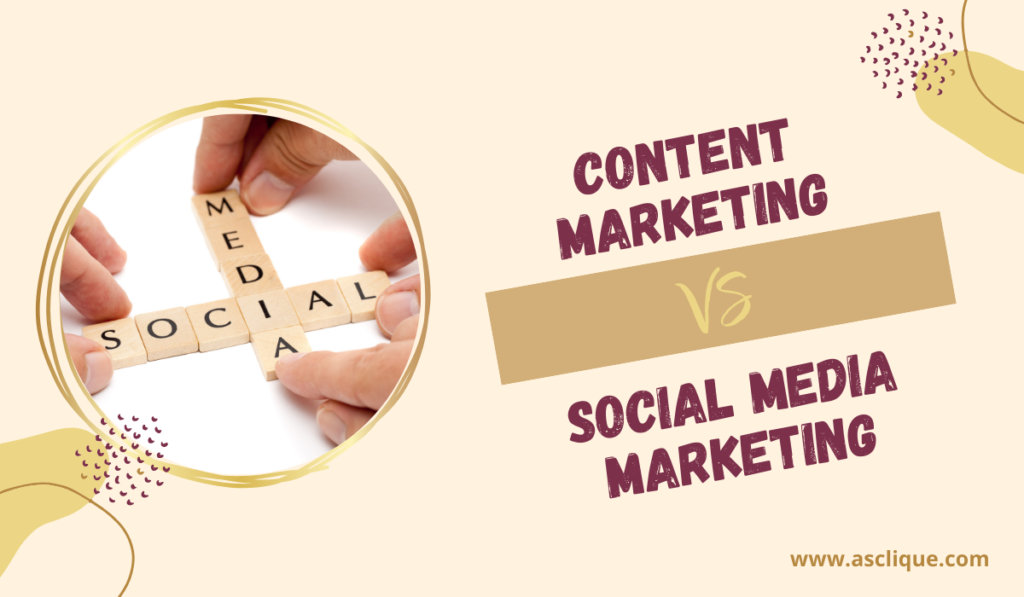Content marketers have a singular goal: generating and sharing content such as articles, blogs, videos/podcasts so they can attract repeat viewers. For those things that you sell, this strategy makes your company an authority in the space as well a memory for when customers have to buy. To reach the goal, we have to spread such content on multiple media channels. While social media marketing is all about engaging in the moment to increase brand awareness, content marketing revolves around creating valuable evergreen content that helps you build authority and trust.
Content Marketing
Content marketing is a strategy that involves creating and sharing valuable, relevant, and consistent content to attract and engage the audience . The Goal of Content Marketing are building trust, establishing authority, and handling the customer’s actions.

It is the practice of developing and distributing meaningful content, such as articles, videos, infographics, and more, to connect with a target audience, build brand awareness, and encourage customer loyalty by providing value without directly promoting a product or service.
Key Components of Content Marketing:
- Blog Posts
- eBooks and Whitepapers
- Case Studies and Testimonials
- Infographics
- Videos and Webinars
- Podcasts
Social Media Marketing
Social media marketing involves utilizing social media platforms to create communities and interact with audiences while sharing content. It revolves around captivating users through content formats like posts, stories, live videos and ads. This is used to accomplish business objectives such, as boosting brand recognition capturing leads and improving conversions.

Social media marketing involves leveraging platforms like Facebook,Twitter and Instagram to showcase your brand, services or content with the aim of driving traffic to your website or landing page .The key goals of this approach include interacting with your followers and earning their trust and loyalty.It is a tool for connecting with your desired audience, within the social media landscape.
Key Components of Social Media Marketing:
- Social Media Posts
- Paid Advertising
- Community Engagement
- Influencer Marketing
- Live Streaming
- Social Media Stories
Content Marketing vs. Social Media Marketing: Key Differences
Content marketing vs social media marketing share the common goal of engaging an audience, they differ in several key aspects:
Purpose and Focus:
Content marketing focuses on engaging the audience by providing informative and valuable long-form content. Its goal is to build trust and position your brand as an industry leader over time by consistently delivering high-quality, value-driven content. This approach helps develop a loyal customer base and enhances your brand’s reputation.
Social Media Marketing: In contrast, social media marketing is focused on building brand awareness and interacting with the audience It’s about being in somebody’s life every day and inducing activity on the fan page in the form of likes, comments and shares almost instantly.
Longevty:
Content marketing often involves creating content with a long shelf life. High-quality, information-rich blogs, videos, or eBooks continue to attract traffic and generate leads long after their initial publication. This content remains relevant to users seeking industry-related information and stays accessible over time.
Channel Usage:
Content Marketing: Content marketing is prone to be implemented on a number of channels for instance blogs, websites email newsletters and third party publications. The content provided is aimed at being eternal in nature as it can be searched through various means of search.
Social Media Marketing: What makes social media marketing unique is its application to social media networks only. The content you produce is specific to the type of media and audience associated with each platform, leveraging on platform specific alignment and behavior.
Audience Interaction:
Content marketing, unlike real-time interactive strategies, focuses on creating valuable content that attracts and engages target audiences. It aims to drive actions such as downloads, subscriptions, and purchases.
How They Work Together
While content marketing and social media marketing have distinct differences, they are most effective when used together as part of a cohesive digital marketing strategy.Let’s Discuss how:-
For content amplification:
A well written content like a blog post or video can be utilized by distributing it across all your social media . The social media acts as a channel to circulate the net traffic to their original content that is on the website. This not only improves the outreach of your content but also helps its reach effectiveness.
For insights gathering:
For authority and trust building:
Content marketing establishes your brand as a leader, while social media marketing amplifies its reach. This is because by spilling quality information through social networks, they give the audience confidence in their brand.
Conversion Handling:
A landing page that meets all conditions, an informative blog or a compelling case study can all result in purchases or registrations.
Social media marketing helps in achieving these goals by bringing attention to these specific pieces of content. Thus helps to convert visitors to customers.
Conclusion:-

